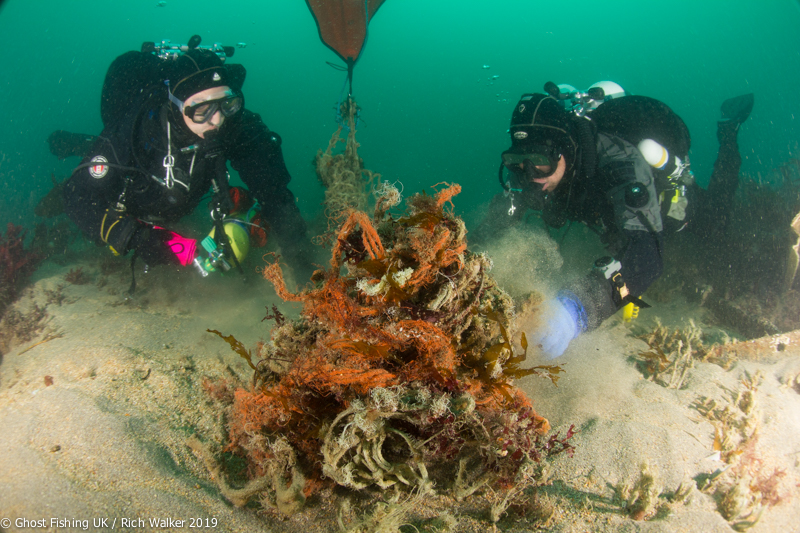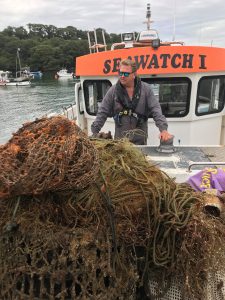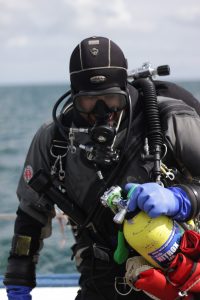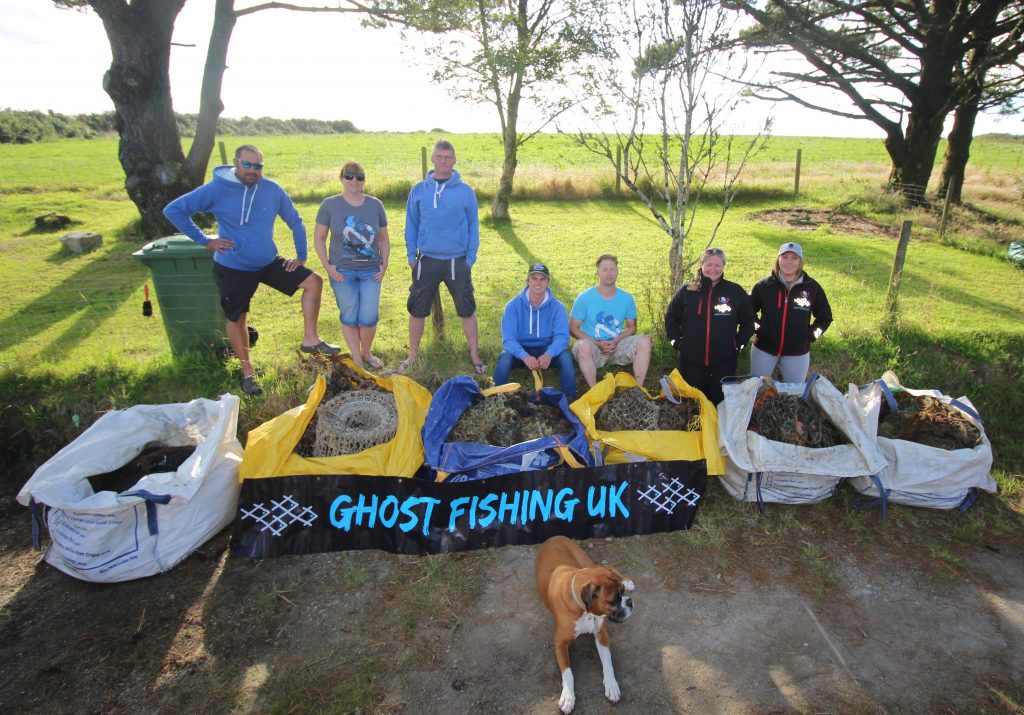 Ghost gear recovery. Image: Rich Walker
Ghost gear recovery. Image: Rich Walker
Over half a tonne of lost fishing gear removed from Cornish waters.
This summer Ghost Fishing UK travelled to Cornwall for our annual week-long expedition. In partnership with the Sea Life Trust, we worked to remove ghost gear from these beautiful coastal waters.
We dived from Mylor Harbour and Porthkerris Dive Centre, and targeted the wrecks of SS Epsilon, and SS Carmarthen, finding both to be covered in ghost gear.
After five days diving the team had successfully retrieved 540 kilograms of mixed net, line, and rope, a figure not including a further four weighty lobster pots.
“Everyday that we’ve been out diving, we’ve pulled out a serious amount of net – big matted balls of ropes, monofilament, different types of plastic netting all balled up together. We’ve been finding nets of different vintages; there’s a lot of nasty plastics down there,” said Christine Grosart, Ghost Fishing UK’s secretary and a trustee.
This year Ghost Fishing UK decided upon Cornwall as the location of operation, while the previous four years we had been based in the Orkney Isles. “We’re aware that Cornwall has a huge fishing community,” says Christine. “We thought it would make sense if we came down here and tried to have a go at removing some of these nets, and also try to meet the community and introduce ourselves to the local conservation organisations. There are lots of them in Cornwall; lots of groups trying to do great things. We thought ‘if we’re going to come down for a week, let’s meet them, let them know what we do, and see if we can work together.'”
We hosted a networking event that was attended by over fifty representatives from Cornish conservation and animal welfare charities, groups, and organisations.
One attendee, Dr James Barnett, who carries out the postmortems on stranded marine mammals with British Divers Marine Life Rescue, discussed his experiences of ghost fishing.
“Most of the dolphins that we see interacting with nets are victims of by-catch. They’re caught in active fishing. Most seals are entangled – caught in ghost gear. The really gruesome cases we see in seals are usually entanglement cases. Seals love interacting with things, they play with them. We used to get entanglement cases [at the Cornish Seal Sanctuary]. We had a horrendous case when I was there, of an animal that was down at Mutton Cove near Godrevy, which had got caught in monofilament net. It had gone right the way round its abdomen. It was probably about a centimetre from getting into its abdominal cavity. It recovered. But around five percent of seals in the wild either show signs of entanglement or are visibly entangled.”
Nigel Hodge, skipper of Seawatch 1, fisherman, and diver knows the Cornish waters like the back of his hand. With over thirty years’ experience, we were keen to charter Seawatch 1 for some of our diving trips. Ghost Fishing UK is not an anti-fishing organisation and is keen to work with the fishing community to address the problem. Nigel commented, “Nets have become cheaper, which means they are now becoming more disposable. The price of fish is now a lot higher. A really good start would be to rebuild the burnt bridge. There is a way forward working with fisherman.”
 |  |
Nigel Hodge skipper of Seawatch 1 with days haul. | Project diver Jason Bramwell. |
Over the coming years Ghost Fishing UK will be focusing more on working with the fishing industry. Christine says, “The interactions that we’ve had with the fishing community whilst we’ve been down here have been very positive. They’re just as frustrated about the ghost gear problem as we are. They don’t want to lose this stuff.”
Fisherman can provide masses of information to Ghost Fishing UK, which could help us to locate lost gear, retrieve it, and ultimately get it back to the fisherman. Dr Barnett says, “As far as by-catch and entanglement is concerned, fisherman don’t want to do it. It’s something that unfortunately is a side-effect of what they do. They’re not deliberately going out there to try and affect the welfare of these animals. They are welfare orientated people. They see it as a big issue.”
Entangled animals serve as bait for more marine animals, and the cycle continues. Further to that, almost all fishing rope, net, and line is now made from synthetic plastic fibres. When left in the ocean, much like plastic bottles or straws, they break down with the wave action into nurdles.
Nurdles are tiny pieces of plastic, and are ingested by sea creatures, causing them to become malnourished. When predators eat these creatures, they too ingest plastic. Plastic has now been found in humans, Arctic ice, and supermarket salt.
Ghost gear is both a hazard to human life, marine life, and the environment – and with hundreds of thousands of tonnes of it in the sea it can survive for up to six-hundred years, snagging on rocks, shipwrecks, and even animals. Following our week in Cornwall a couple of wrecks are clear of it, but there is still plenty more to do.
 Lincoln (canine, front) inspects the ghost gear removed from Cornish waters.
Lincoln (canine, front) inspects the ghost gear removed from Cornish waters.
Ghost Fishing UK is grateful to the Sea Life Trust for funding this mission, and our project divers and surface team who volunteered their time during the week (Emma Biggs, Jessica Collins, Jason Bramwell, Toni Bryant, Sophie Devereau, Paul Griffin, Christine Grosart, Mark Hall, Rob Hanlon, Rannvá Tórfríð Jørmundsson, Martin Maple, Constance Morris, Fred Nunn, Dan Rawbone, Simon Scott, Gemma Thompson, Rich Walker, John Wheeler).
This blog post is based on a press release prepared by Sophie Devereau.
